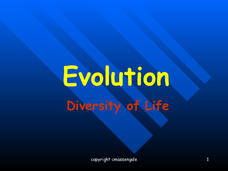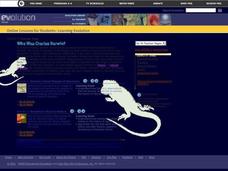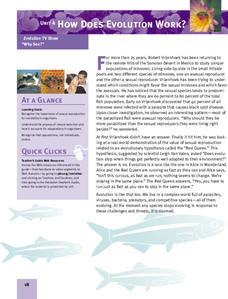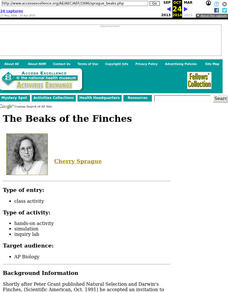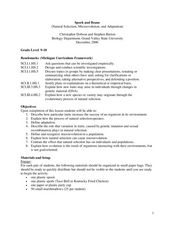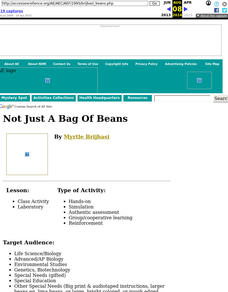Curated OER
Natural Selection.... a Cumulative Process... it's in the cards!
Learners working in pairs attempt to produce a full sequence of 13 cards of one suit (ace - to king). This must be done by shuffling the suit of cards for each round, then checking the cards.
Curated OER
The Chips Are Down: A Natural Selection Simulation
Students, in teams, use different colored paper chips to represent prey and a piece of fabric as the environment.
Curated OER
The Great Jellybean Hunt
Students model natural selection by acting as predators of jellybeans. In this evolution lesson plan, students use plastic utensils to pick up jellybeans. They use different colors of backgrounds to demonstrate the effects of camouflage...
Curated OER
Lamarck And Darwin
Students compare Lamarck's mechanism for evolution with Darwin's theory of natural selection.
Curated OER
Mimicry: An Example of Adaptation
Students are able to explain the relationship between adaptation and ability for survival and reproduction. They are able to give examples of a series of adaptations that would support the idea that evolution is a series of minor...
Biology Junction
Evolution – Diversity of Life
Scientists noticed animals with backbones share similar bone structure despite having different forms, such as fins, arms, and wings. Young scientists gain an appreciation for evolution by understanding the history of the theory. They...
Howard Hughes Medical Institute
Beaks as Tools: Selective Advantage in Changing Environments
How does nature select some adaptations over others? Scholars experiment picking up seeds with two different types of tools simulating beaks. After practicing, they experience a drought where one type of seed suddenly isn't available....
California Academy of Science
Color Vision Genetics Evolution Simulation
At one point, all mammals carried only two color receptors, but now most humans carry three. An informative presentation and hands-on activity demonstrate how this evolved through genetics. By participating in the activity, pupils...
Curated OER
Who Was Charles Darwin?
High schoolers complete two activities to study Charles Darwin's Theory of Natural Selection. They read Darwin's journal from the voyage of the Beagle and look at the scientific ideas that influenced the development of his theory.
Curated OER
Diversity/Natural Selection
High schoolers examine mechanisms behind biological evolution and the theories that feed it, and are able to demonstrate their knowledge of these theories in a story.
Curated OER
How Does Evolution Work?
Students pretend they are a scientist like John Endler in this Web activity. They visit his pools, from hypotheses, and test them out. In the process, the explore about natural selection and sexual selection. They are able to explain the...
Curated OER
Evidence of Evolution by Natural Selection - Testable Hypotheses
The factors that affect selection and evolution are investigated here. Information about some common ancestry examples are given but with no real scientific evidence. This presentation is very obvious in making biased claims about...
Curated OER
Roots: The Ancestry of Modern People
High schoolers investigate the models for the origin of modern humans and the conditions that facilitate speciation and evolution. The classification and nomenclature of hominid species is also examined.
Curated OER
How Evolution Works
Students examine the term natural selection and what behavioral adaptations are. In this evolution lesson students view videos about evolution and perform experiments that simulate populations that interplay between the forces of...
Curated OER
How Evolution Works
High schoolers discuss the evolution of the eye and how a complex organ can evolve through natural selection. They research genetic variation, adaptation, and sexual selection. They analyze data to determine how beak length of Gal??pagos...
Curated OER
How Does Evolution Work?
Middle schoolers are introduced to how the process of evolution works. As a class, they review the characteristics of natural selection and how those with advantageous traits reproduce and survive. To test this theory of natural...
Curated OER
The Beaks of the Finches
Students become birds and are given "beak-types". After completing the simulation, students relate results to adaptations and natural selection. Extensions of the simulation allow for comparative results and include population genetics.
Howard Hughes Medical Institute
The Making of the Fittest: The Birth and Death of Genes
Adaptations must be made as environments change. This fabulous presentation features Icelandic icefish, a transparent, scaleless specimen that even has colorless blood. Genetics and adaptations concepts are explored as scientists study...
Curated OER
Applied Evolution: How Will We Get There from Here?
Students explore the basic process of natural selection and how people can manipulate that process today. The consequences of natural selection on daily life and the implications of evolutionary biology in basic and applied science is...
Curated OER
The Theory of Evolution
In this theory of evolution worksheet, students will review the role Charles Darwin played in the theory of evolution, natural selection, and adaptations. Students will explore some of the different types of evidence for the theory of...
Curated OER
Survival of the Fittest – Battling Beetles
Students explore natural selection. For this genetic adaptation lesson plan, students discover why certain traits continue and some traits disappear. Students discover how species evolve and change. Resources are provided.
Curated OER
The Rise and Fall of the Mammoths
Students develop an understanding of the evolution of species in the context of the woolly mammoth. They examine the fossil record to explain natural selection.
Curated OER
Spork and Beans
Students examine natural selection, how it works and how it can cause microevolution. In this evolution lesson students complete a lab activity that shows the effects that natural selection has on organisms.
Curated OER
Not Just a Bag of Beans
Learners determine the types of natural selection and variation that exists in a population, using beans.







